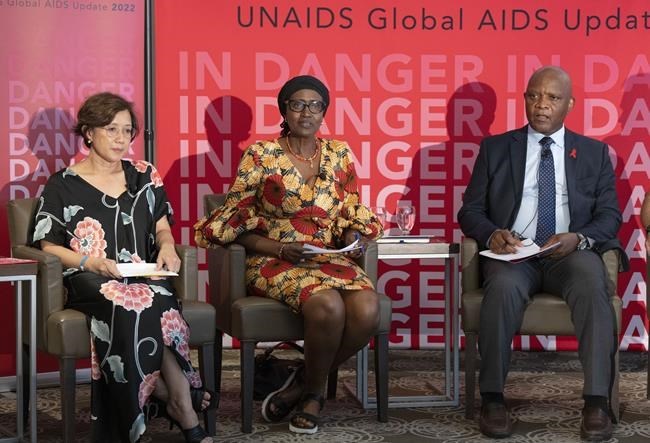MONTREAL — Ahead of a major international AIDS conference in Montreal, researchers and officials on Wednesday promoted the progress toward finding a cure for HIV but lamented how the COVID-19 pandemic disrupted the global fight against the disease.
A report released Wednesday by UNAIDS — the Joint United Nations Programme on HIV/AIDS — said about 1.5 million people were infected with HIV in 2021. That number is 3.6 per cent less than the year before but the smallest drop in the number of new infections since 2016.
UNAIDS executive director Winnie Byanyima told reporters in Montreal that global crises, such as the COVID-19 pandemic and the war in Ukraine, are responsible for "derailing" progress against HIV.
"The response to the AIDS pandemic has been derailed by global crises, from the colliding pandemics of HIV and COVID, to the war in Ukraine and the resulting global economic crisis," Byanyima said.
In the Asia and Pacific region, Byanyima added, the number of new infections rose in 2021 after declining for several years. In other parts of the world, she said, progress has stalled.
Approximately 650,000 people died from HIV in 2021, according to the United Nations.Â
"If these trends continue, we could see 7.7 million additional AIDS-related deaths in this decade," Byanyima said.Â
The report arrived two days before the beginning of AIDS 2022, the 24th International AIDS Conference, in Montreal. More than 9,000 researchers, medical practitioners and people living with HIV are scheduled to attend the conference in person; another 2,000 delegates are registered to attend online.
Earlier on Wednesday, researchers spoke about the progress that has been made toward a cure for HIV.
Dr. Jana Dickter, a researcher at the City of Hope medical centre in California, told reporters that a 66-year-old man with HIV who was treated with a stem cell transplant for acute leukemia has been in remission from both conditions for 17 months.
Dickter, whose research is being presented at the conference, said the patient is the fourth person known to have achieved HIV remission after receiving a stem cell transplant from a donor with a rare genetic mutation.
"This case opens up possibilities for other older persons living with HIV and a blood cancer to receive a transplant and achieve remission from both diseases if a donor with this rare genetic mutation can be identified," she said, adding that stem cell transplants aren't an option for most people with HIV, due to the significant potential side-effects.Â
Madisa Mine, a virologist with Botswana's Ministry of Health and Wellness, will present research at the conference showing that 95.1 per cent of people in 2021 with HIV in the country knew their status, that 98 per cent of those individuals were on antiretroviral treatment and that 97.9 per cent of those receiving treatment had a suppressed viral load. More than 20 per cent of people aged 15 to 64 in the southern African country are HIV-positive.
"Overall, Botswana has made tremendous progress in the past 20 years, and we strongly believe that we are well positioned to end the AIDS epidemic by 2030," Mine said.Â
According to the UNAIDS report, in 2021, 85 per cent of people around the world living with HIV knew their status, 88 per cent of those people were receiving treatment and 92 per cent of people receiving treatment carried a suppressed viral load. UNAIDS has set a goal of reaching 95 per cent in all three categories by 2025.Â
This report by The Canadian Press was first published July 27, 2022.
Jacob Serebrin, The Canadian Press




